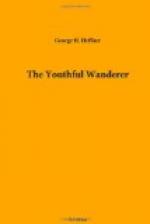When I came into view of Guttannen, the first village of any considerable extent that I passed after seeing the Rhone Glacier and the wildnesses of the Grimsel and Haslithal, where no houses except hotels, and in some places not even trees or grass abound, I felt glad once more to see a group of human habitations, and determined to count them, so that I might record their number. I passed along the edge of the mountains where I could easily overlook the village, but it was in many instances impossible to determine by a survey of their external appearances, which were the stables and which the houses or huts, so I counted them all, large and small, and found their number between 60 and 90. I once intended to count these buildings only with windows, as houses; but I soon discovered that some huts had windows only on one or several sides, and looked like stables on the other sides!
A question to dairy men: Do thunder and lightning affect fresh milk? A lady keeping a cafe in Brienz, told me that if a thunder storm overtook those which were bringing the fresh milk from the mountains, the milk would suddenly turn sour, so that it could no longer be boiled for drinking it sweet. She said, “Es thut sie verbolera, so das sie gerinnt wen man sie kochen will!”
Chapter XVI.
Geneva to Turin.
Switzerland has two national languages, the German and the French, both of which are recognized by the Government. Geneva is French, so I had some trouble in getting my information and procuring a ticket for Italy. I left Geneva at 6:40 a.m., September 10th; and after passing through a number of tunnels, one of which required 5-1/2 minutes of moderate railway speed, we arrived at Bellegarde, on the French border, and passed muster. From 9:00 to 10:00 o’clock we were detained at Culoz, and by noon we saw the snow-covered Alps again. At 3:30 p.m., we arrived at Modane and passed muster for Italy.
Mont Cenis Tunnel.
We entered the mouth of this great tunnel, over 8 miles in length, at 4:58-1/2 p.m., and were exactly 26 minutes in the very bowels of the earth, where absolute darkness reigns. Temperature in the middle, 59 deg. Fahrenheit.
Italy.
We now come to a country which contrasts as strangely with the nations of western Europe, as those do with America, or as Alpine Switzerland does with the rest of the world. When I parted at Paris with my New York friend, he bound for Rome, I for the north, we still had our school-boy ideas of Germany, Switzerland and Italy; and I shall never forget the remark which he then made, and which embodied my notions and anticipations perhaps as well as his own. He said, “I suppose we have now seen the brightest side of the picture, the trouble is that scenes will now become tamer as we advance toward the cradle of humanity.” I had been pleasantly disappointed almost every time that I entered a new country, but now, as I was entering




